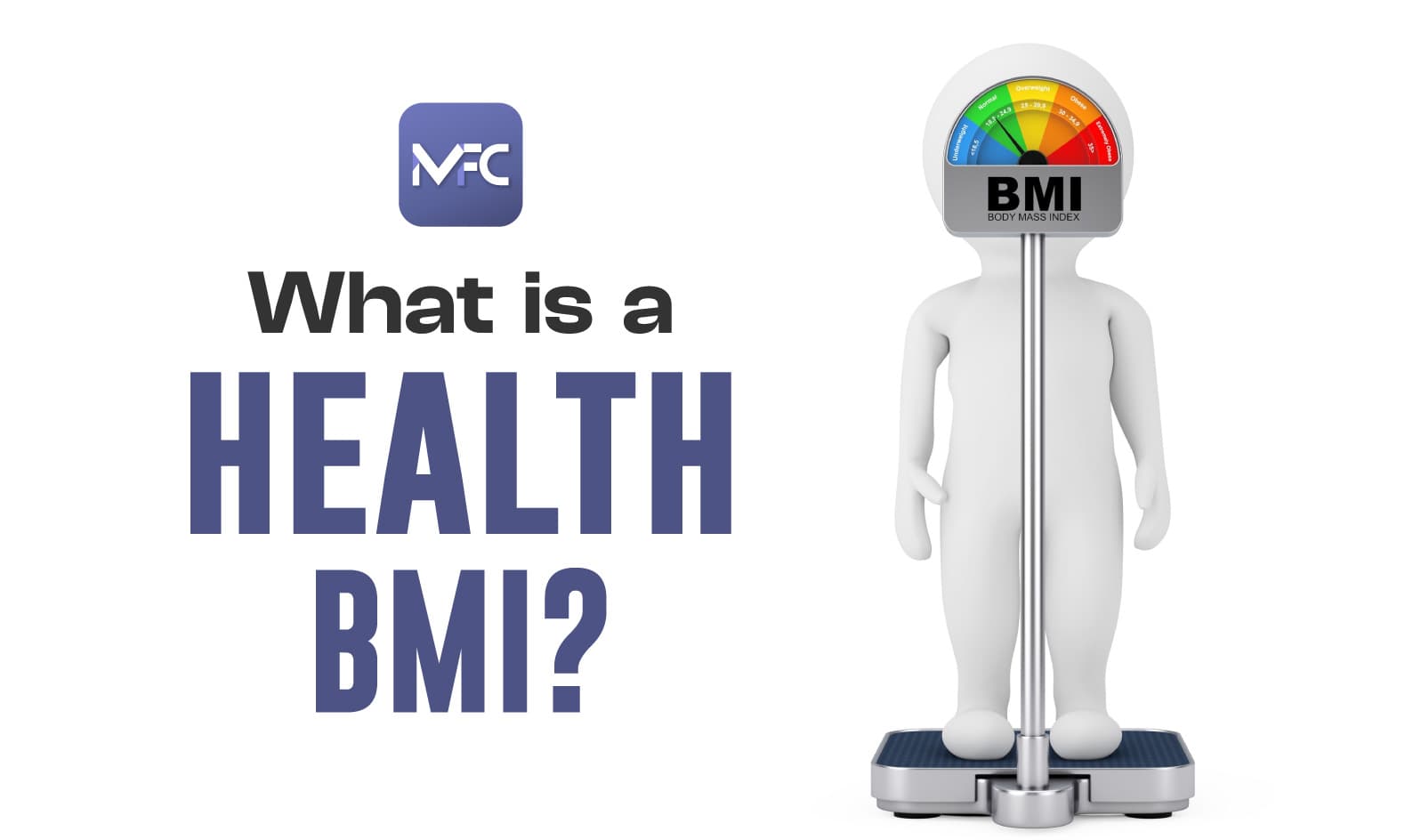What is a Healthy BMI, and How Important Is It?

MyFitnessCoach
December 4, 2024
When people talk about health and fitness, BMI (Body Mass Index) often comes up as a way to understand if a person has a healthy weight. This simple metric helps indicate if someone is underweight, overweight, or in a healthy weight range. However, BMI isn’t the only measure of health, and understanding its importance and limitations can help you make more informed fitness choices. In this article, we’ll explore what a healthy BMI is, how BMI is calculated, its limitations, and how you can use it in your fitness journey with the MyFitnessCoach app.
Understanding BMI Categories
BMI offers a range of categories to give a general picture of body weight related to health:
- Underweight: BMI below 18.5
- Normal Weight: BMI between 18.5 and 24.9
- Overweight: BMI between 25 and 29.9
- Obese: BMI of 30 and above
The healthy BMI range is often highlighted as the target for weight management goals. However, these numbers should be viewed with some flexibility, as they do not account for other factors such as body composition, muscle mass, and individual health circumstances.
How Important is BMI for Health?
While BMI provides an easy reference point, it is not the definitive measure of health. Several factors can impact whether BMI alone accurately reflects an individual’s health status. Here’s a closer look at BMI’s importance and limitations.
1. BMI Provides a General Health Overview
BMI can be useful for a general understanding of body weight relative to height. It’s an easy-to-calculate number that allows people to understand if they are within a range that research suggests is associated with a lower risk of various health issues. For instance, people within a “normal” BMI range often have a reduced risk of heart disease, diabetes, and certain cancers compared to those in the overweight or obese categories.
2. BMI Has Its Limitations
BMI does not differentiate between muscle and fat. For example, an athlete with a muscular build may have a high BMI, but their body composition could be very healthy. On the other hand, someone with a normal BMI might have low muscle mass and a higher proportion of body fat, which can still impact health negatively. Additionally, BMI does not account for factors like age, gender, and ethnic background, all of which can play roles in body composition and health risks.
3. BMI Alone Doesn’t Define Fitness
Health and fitness encompass more than weight. Cardiovascular fitness, strength, flexibility, and mental wellness also contribute to a person’s overall health. Focusing solely on BMI can lead people to overlook these aspects, potentially impacting their wellness journey. By focusing on multiple health indicators, you can gain a clearer picture of your fitness.
4. BMI and Risk Factors for Chronic Diseases
Research links high BMI with an increased risk of chronic diseases like Type 2 diabetes, hypertension, and heart disease. While BMI is just one measure, maintaining a healthy BMI alongside other lifestyle factors, such as regular exercise and a balanced diet, can play a crucial role in reducing these risks. Lowering BMI in a sustainable way can contribute positively to long-term health, but it’s most effective when paired with other health-conscious choices.
BMI and Body Composition
Body composition analysis is another helpful tool in understanding your health and fitness. Unlike BMI, which only considers height and weight, body composition measurements assess the proportion of muscle, fat, bone, and water in your body. This data can provide a more detailed understanding of health beyond what BMI can offer.
For example, two people with the same BMI may have different body compositions. One might have more muscle mass, which is beneficial for metabolism and strength, while the other may have more fat. Using BMI alongside body composition measurements allows for a more well-rounded picture of health.
Should You Rely on BMI Alone?
Relying solely on BMI as a health indicator can lead to misconceptions. It’s best to view BMI as one piece of a larger health puzzle. Here are a few additional metrics and lifestyle habits that can provide a fuller view of health:
- Waist Circumference: Higher waist measurements can indicate more abdominal fat, which is linked to higher health risks.
- Physical Activity Levels: Staying active is crucial for health regardless of BMI.
- Diet Quality: Nutrient-rich foods support your body beyond simple weight maintenance.
- Mental Health and Stress Management: Health isn’t just physical. Reducing stress and maintaining a positive mindset contribute significantly to wellness.
How to Maintain a Healthy BMI
While BMI has its limitations, it can still serve as a useful guide if combined with other health indicators. Maintaining a healthy BMI can be a positive goal if it aligns with a balanced approach to fitness and health. Here are some tips to help keep your BMI within a healthy range:
1. Adopt a Consistent Exercise Routine
Exercise is one of the most effective ways to manage weight and improve overall fitness. Both aerobic exercises, like running or cycling, and strength training help maintain a healthy BMI. A mix of cardio and strength training can help you build muscle, which may increase your BMI slightly but improve your body composition and health.
2. Focus on Nutrition
Eating a well-balanced diet supports a healthy weight and overall well-being. Include lean proteins, healthy fats, whole grains, and plenty of fruits and vegetables in your diet. Limit high-sugar, highly processed foods that can lead to weight gain and increased BMI.
3. Set Realistic Goals
When working towards a healthy BMI, setting small, achievable goals can make the process more manageable. Aim to lose weight gradually, which is healthier and more sustainable in the long run. Avoid focusing solely on the numbers; instead, concentrate on how you feel and the energy you gain from leading a healthier lifestyle.
4. Track Your Progress
Tracking changes in BMI, weight, and body composition over time can help keep you on course. However, remember that fluctuations are normal, and progress is not always linear. Embrace the journey and acknowledge your achievements along the way.
How MyFitnessCoach Can Help You Manage BMI and Beyond
At MyFitnessCoach, we understand that reaching your fitness goals involves more than hitting a specific BMI. Our app offers tools designed to support a well-rounded approach to health. From personalized workouts to nutrition guidance, MyFitnessCoach helps you stay active, eat well, and keep track of your progress.
For those looking to manage their BMI, our app’s features like tailored HIIT training plans and progress tracking allow you to see improvements in strength, endurance, and body composition over time. Plus, our fitness tracking system provides insights into your overall progress, not just your BMI, so you can focus on building lasting habits that contribute to a healthier, happier life.

By using MyFitnessCoach, you can access a holistic fitness journey where BMI is just one of many aspects of wellness. Start working towards your goals with the support of expert training programs and motivational tools that make fitness an achievable, enjoyable part of your routine.
Similar Articles
Stay informed with these similar articles.

MyFitnessCoach
October 18, 2023
What Does Body Goals Mean? A Path to a Healthy Lifestyle
In the world we live in now, lots of people talk about "body goals," which means having a body that's seen as perfect. On social media, in magazines, and on TV, we see lots of pictures of people with what seems like perfect bodies, which makes us feel like we have to look like them. But the real meaning of "body goals" is more than just looking good. It's about taking care of your whole self, not just how you look. In this article, we will discuss what does body goals actually mean and how you can achieve your body goals. Let’s get started:
.webp&w=3840&q=75)
MyFitnessCoach
September 5, 2023
How Much Protein in an Egg | The Nutritional Power
Eggs have long been a breakfast favorite for many, and for good reason. They're not only delicious but also packed with essential nutrients, making them a versatile and nutritious addition to your diet. One of the most common questions about eggs is, "How much protein is in an egg?" In this comprehensive guide, we'll delve into the world of eggs and explore their protein content, nutritional benefits, and how they can contribute to a balanced diet.

MyFitnessCoach
May 18, 2023
Fitness Guide: How Do I Start A Weight Loss Journey
Ready to start on a life-changing weight-loss journey? Congratulations for taking the first step towards being a better and happier version of yourself! Starting off a weight-loss journey may be both satisfying and stressful. With so much information available, having a well-defined plan and trusted assistance in achieving your goals is important. This article will help you start your weight-loss journey and achieve the results you desire.
